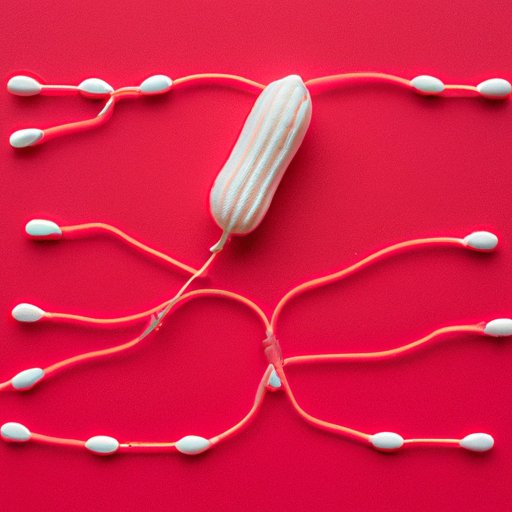
Introduction
There are a lot of misconceptions and myths when it comes to pregnancy and conception, and one of the most popular is getting pregnant on the last day of your period. Many people believe this is impossible, but is it? In this article, we will investigate this question and provide you with accurate information about conception.
Debunking the Myth: Why Getting Pregnant on the Last Day of Your Period is Highly Unlikely
Before we dive into the details of why it’s unlikely to conceive on the last day of your period, let’s first talk about the menstrual cycle. The menstrual cycle is the process by which a woman’s body prepares for pregnancy. It happens every month and includes the shedding of the uterine lining (menstruation), the development of a new egg (ovulation), and the thickening of the uterine lining in anticipation of a fertilized egg.
Pregnancy occurs when sperm fertilizes a mature egg. So, for pregnancy to happen, a woman needs to have an egg available for fertilization. The egg is usually released from the ovaries between day 12 and day 14 of the menstrual cycle. However, sperm can live inside the female reproductive tract for up to five days. This means that if you have sex towards the end of your period, the sperm can survive until the egg is released, which increases the chances of getting pregnant.
Even though the chances are higher, getting pregnant on the last day of your period is still unlikely. Here’s why: The typical menstrual cycle lasts between 28 and 32 days, and the bleeding usually lasts between three and seven days. Sperm can survive inside the female reproductive tract for up to five days, but the chances of a sperm cell surviving that long during a five-day period are very slim. Additionally, the release of the egg is not always on the same day. It can vary from one cycle to the next, making it even more difficult to predict.
The Science Behind Conception: Analyzing the Probability of Getting Pregnant on the Last Day of Your Period
There are several factors that can affect a woman’s chances of getting pregnant, and understanding these factors can help you maximize your chances of conceiving. Here are some of the main factors:
Age
A woman’s age is a key factor in fertility. Women are most fertile in their 20s and early 30s. After the age of 35, fertility starts to decline, and the risk of pregnancy complications increases.
Ovulation
Ovulation is the process by which the ovary releases an egg. As we mentioned earlier, the egg is usually released between day 12 and day 14 of the menstrual cycle. However, this can vary from one cycle to the next.
Sperm count and quality
Sperm count and quality are essential for fertilization to occur. If the sperm count is low or the quality of the sperm is poor, it can make it difficult for fertilization to occur.
Stress and lifestyle factors
Stress and lifestyle factors like smoking, alcohol consumption, and a poor diet can have a significant impact on your fertility. Reducing stress and adopting healthy habits can help improve your chances of conceiving.
Understanding Your Menstrual Cycle: A Guide to Fertility and Conception
Now that we’ve covered the basics of conception let’s take a closer look at the menstrual cycle and how it affects fertility. The menstrual cycle is divided into four phases:
Menstruation Phase
This is the phase when the uterus sheds its lining and causes bleeding. It usually lasts between three and seven days, depending on the woman’s body.
Follicular Phase
The follicular phase starts on the first day of the menstrual cycle and lasts until ovulation. During this phase, the ovary prepares for ovulation by developing a follicle to house the egg.
Ovulation Phase
The ovulation phase is the most crucial phase in the menstrual cycle for pregnancy. It’s when the egg is released from the ovary and travels down the fallopian tube, where it can be fertilized by sperm.
Luteal Phase
The luteal phase begins after ovulation and lasts until the next menstrual cycle starts. During this phase, the uterus prepares for pregnancy by thickening the lining. If the egg is fertilized, it will implant in the uterus during this phase.

Planning Your Pregnancy: Tips on How to Maximize Your Chances of Conceiving
There are several things you can do to increase your chances of conceiving:
Improve your fertility
Eat a healthy diet, exercise regularly, and minimize stress to improve your overall health and fertility.
Track your ovulation
Knowing when you ovulate is essential for planning sex and increasing your chances of conceiving. Use a fertility tracker, basal body temperature monitoring, or ovulation predictor kits to track your ovulation.
Have sex during your fertile window
Your fertile window is the period when you’re most likely to get pregnant. It’s usually a few days before and after ovulation. Try to have sex during this period.
The Role of Ovulation in Pregnancy: Why Timing is Everything
Identifying ovulation is crucial when trying to conceive. Here are some ways to determine when ovulation is occurring:
Calendar method
The calendar method involves tracking your menstrual cycle on a calendar and identifying when you’re most likely to ovulate. However, this method is not very reliable as the timing can vary from one cycle to the next.
Basal body temperature
Your basal body temperature (BBT) is your body temperature when at rest. Tracking your basal body temperature can help you identify when ovulation is occurring. Your BBT will rise slightly when you ovulate.
Cervical mucus
Your cervical mucus changes throughout your menstrual cycle. It’s thick and sticky just after your period, and it becomes clearer and more slippery as you approach ovulation. Monitoring your cervical mucus changes can help you identify when ovulation is occurring.
Natural Family Planning: Using Your Cycle to Help You Get Pregnant (or Avoid Pregnancy)
Natural family planning involves using the knowledge of your menstrual cycle to help you get pregnant or avoid pregnancy. This method involves tracking your menstrual cycle and identifying when you’re most fertile or least fertile.
It can be a useful method for couples who want to get pregnant, but it requires discipline and diligence. When done correctly, it can be an effective way to plan or avoid pregnancy without the use of drugs or devices.
The Truth About Conception: Debunking Common Myths and Misconceptions
As we mentioned earlier, there are a lot of myths and misconceptions when it comes to conception. Here are some of the most common:
Myth: You can’t get pregnant during your period.
Reality: While it’s unlikely to get pregnant during your period, it’s not impossible. Sperm can survive inside the female reproductive tract for up to five days, and the timing of ovulation can vary from one cycle to the next.
Myth: You can’t get pregnant if you have sex standing up.
Reality: The position you have sex in has no impact on your chances of getting pregnant. What matters is having sex during your fertile window.
Myth: Using birth control for a long time can reduce your fertility.
Reality: Using birth control does not impact fertility in the long term. Your fertility will return to normal once you stop using birth control.
Conclusion
Pregnancy and conception can be complicated topics, but understanding the basics can help you make informed decisions about your reproductive health. Remember to track your menstrual cycle, improve your fertility, and have sex during your fertile window to maximize your chances of conceiving. By debunking the myths and understanding the science behind conception, you can take control of your reproductive health and plan your pregnancy with confidence.





